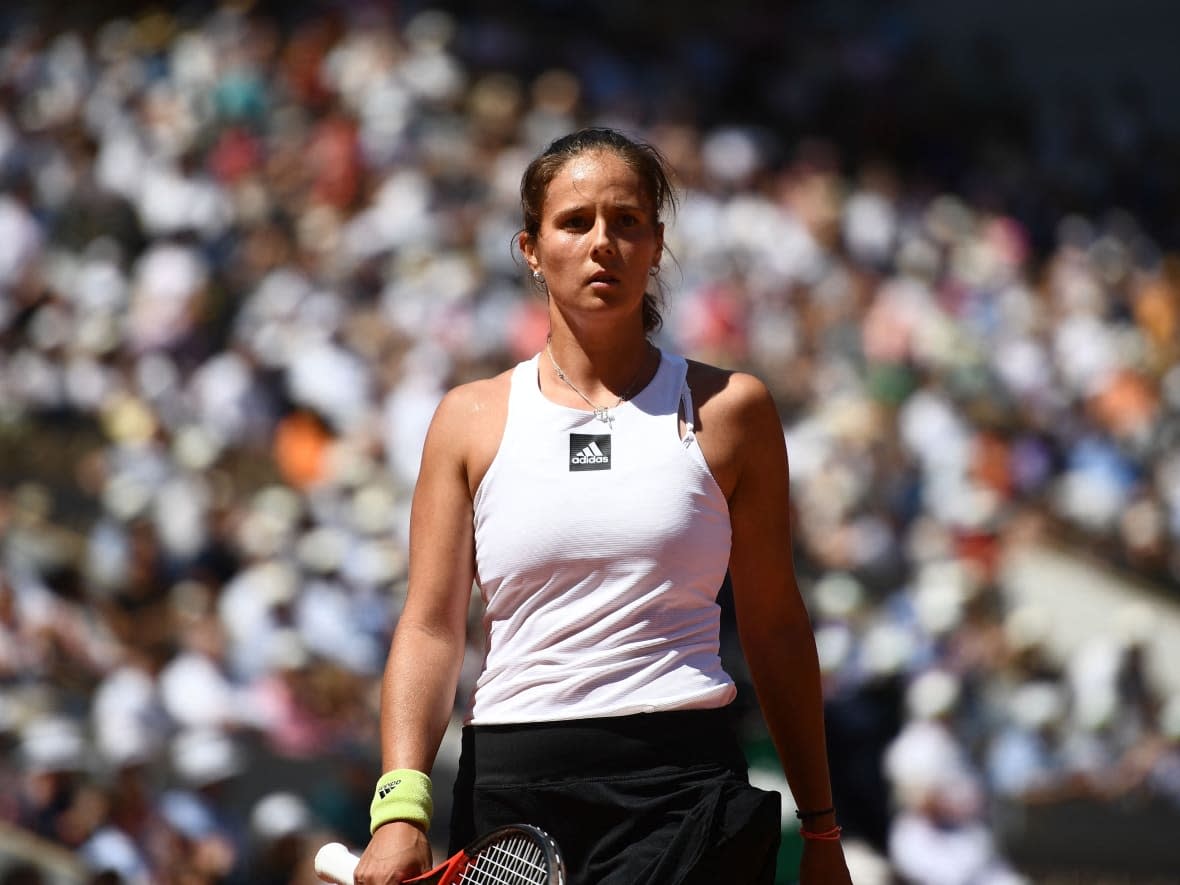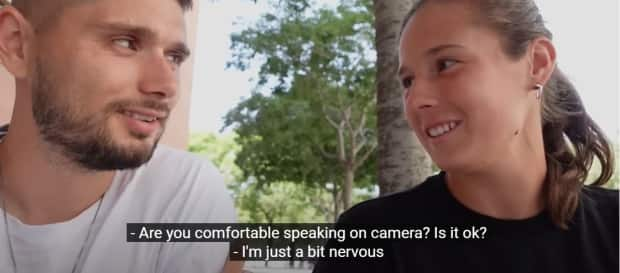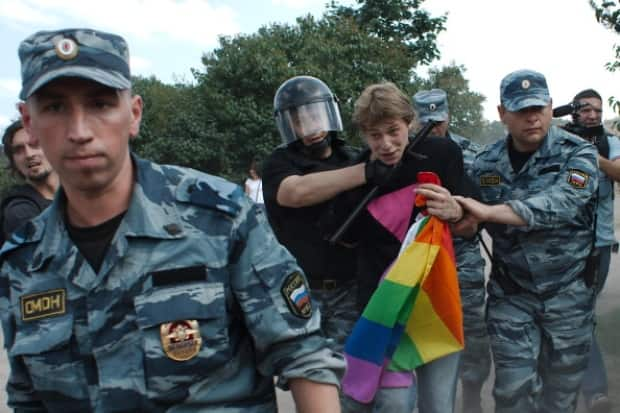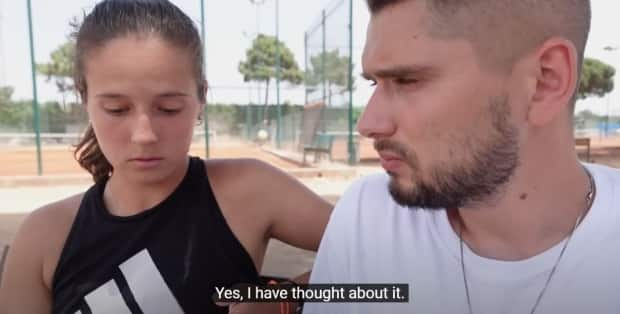Double the risk for Russian tennis star speaking out on LGBTQ rights and war in Ukraine

Russia's top female tennis player, Daria "Dasha" Kasatkina, has done something no Russian athlete of her rank has done before — she came out.
While seeing a professional athlete from Canada or the U.S. speaking openly about their sexual orientation or gender identity has become more common, for Russian athletes, it's virtually unheard of.
But in an interview posted online this week, the 25-year-old spoke about being in a relationship with another woman. She also shared a photo on social media with a woman she referred to as "my cutie pie" — Olympic figure skater Natalia Zabiiako.
Kasatkina, who now lives and trains in Spain, wasn't explicit about her orientation but described how hard it is for anyone to be gay in Russia.
"Living in peace with yourself is the only thing that matters, and f--k everyone else," read an English translation of the World No. 12's Russian comments to independent sports journalist Vitya Kravchenko.
Her announcement followed another athlete's revelation. Women's soccer player Nadezhda "Nadya" Karpova spoke with BBC in June about being a lesbian and feeling more free to live openly now that she also lives in Spain and plays for a Spanish team.
Athletes also critical of Russian invasion of Ukraine
Both women were also critical of their home country's invasion of Ukraine, with Karpova saying she "can't just look at this inhumanity and stay silent." Kasatkina said she wants the war to end and said not a day has gone by since it began that she hasn't thought of it.
"I can't imagine what they're going through; it's a full-blown nightmare," she said in the interview.
"I wouldn't imagine something like that would happen [with] an athlete who was residing in Russia because of the risks, you know, that are related to those kinds of statements," Elena Lipilina, president of the independent Russian Federation of LGBT Sports, told CBC News.
She applauded the athletes' openness as "empowering."

Condemning the war and speaking publicly about LGBTQ issues could cause these athletes a lot of trouble in Russia, where homophobic rhetoric — including recent attempts to further criminalize talking about LGBTQ issues in media or in public — is intertwined with the Kremlin's messaging on its war in Ukraine.
"I think in the minds of these very brave women, they came out [and] they sort of, like, did two blows to the Russian government," said Dilya Gafurova, head of the Russian LGBTQ rights organization Sphere.
The crime of speaking up
Since March, criticism of the military invasion of Ukraine has been a criminal offence in Russia, where it's referred to as a "special operation." Human Rights Watch called this a "ruthless effort to suppress all dissent" and dozens of activists, journalists and regular citizens now face charges.
There was also a ban enacted in 2013 on the promotion of "non-traditional sexual relationships" to minors — in film and television, online and through public events — which is punishable with fines and/or jail time. But there are new efforts to expand that law to outlaw any discussion of sexual and gender identity in media.
Lipilina said the attacks on LGBTQ rights in Russia helped lay the groundwork for Russia's offensive in Ukraine — and vice versa — explaining that crackdowns on civil liberties and human rights precede acts of aggression.
WATCH | Putin's propaganda campaign gets help from Westerners:
Blaming 'Western influence'
The government, Gafurova said, considers speaking out on LGBTQ rights or providing "any sort of criticism of the government's actions" to be motivated by "Western influence." Her organization is among those the government deems as a "foreign agent."
Lisa Sundstrom, a political science professor at the University of British Columbia, who researches Russian politics and civil society activism, said the war, in President Vladimir Putin's eyes, is as much about NATO "encroaching" on Russia's borders as it is about Western values and influence inching closer.
And with the conflict not going as well as the Kremlin may have expected, Sundstrom said it's possible targeting LGBTQ people "is a good way to kind of change the channel to seek out an alternative enemy."
The language used in the lead up to the invasion, five months ago this week, has similarities to the narratives used against Russia's LGBTQ community.
Putin, and his cohort, have taken aim at what are seen as "non-traditional" values in Russian society — something he underscored in his Feb. 24 speech marking the start of the invasion.
"They sought to destroy our traditional values and force on us their false values that would erode us," Putin said, referring to the U.S. and its Western partners. "The attitudes they have been aggressively imposing on their countries, attitudes that are directly leading to degradation and degeneration, because they are contrary to human nature."

The head of the Russian Orthodox Church also justified the invasion. He suggested allowing LGBTQ Pride parades served as a "loyalty test" to Western nations and there is a "fundamental rejection" of such Western values in separatist territories of Ukraine's Donbas region that Russia claims to be protecting.
Garufova said this reflects a move, over the past decade, to centre Russian policymaking around "traditional values, and that Russia is presenting itself as "one of the few countries that still hasn't backed down in the face of the propaganda of everything non-traditional."
Though Sundstrom said the notion of "non-traditional" goes beyond just LGBTQ people, and includes anyone challenging the traditional family values and gender roles — including feminist activists.
"They've been some of the most mobilized, organized, active, anti-war voices," she said. A further crackdown on LGBTQ rights, by amending the non-traditional sexual relations propaganda law, is also a means of trying "quash their speech," she added.
'People have been jailed for less'
Kasatkina did something "inspiring" for many young Russians by "simply coming out of the closet," said Lipilina. "We need more people like Dasha to take a stand and a stance for LGBTQ community."
But she's well aware there could be repercussions for the tennis player.
"People have been jailed for less," she said.

Kasatkina, in her interview, admitted she is worried about the repercussions of what she said, even the possibility of property being seized or her citizenship revoked.
Gafurova told CBC News Kasatkina may not face any direct repercussions for her words yet but she suggested the emerging athlete likely has family and friends still living in Russia who could be negatively affected.
Sofya Tartakova, a host on the state-run sports network Match TV, was reportedly fired Wednesday after criticizing how a show on the network handled a discussion about the tennis star. Tartakova is also reported to be Kasatkina's public relations agent.


